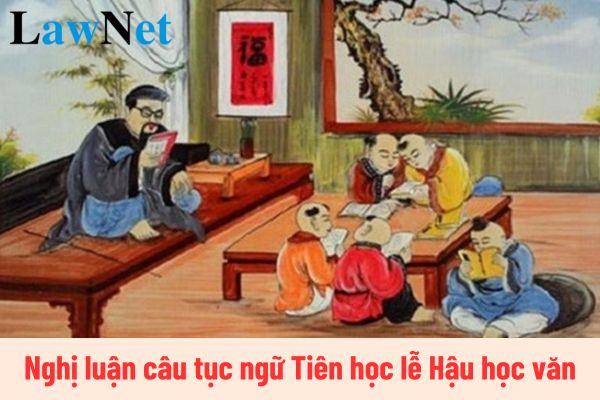Vietnam: What are the sample social argumentative essays on the Proverb "learn manners first, then learn literature"? What are the 05 key qualities required for 12th-grade Literature?
What are the sample social argumentative essays on the Proverb "learn manners first, then learn literature" in Vietnam?
The social argumentation on the proverb "learn manners first, then learn literature" is a type of writing where the author will analyze, evaluate, and present personal thoughts on the meaning and value of this proverb in modern life.
The social argumentation on the proverb "learn manners first, then learn literature" is practiced by 12th-grade students in the 12th-grade Literature curriculum.
12th-grade students can refer to the following sample social argumentative essays on the Proverb "learn manners first, then learn literature" in Vietnam:
|
Social argumentative essays on the Proverb "learn manners first, then learn literature"
|
*Note: The above sample social argumentative essays on the Proverb "learn manners first, then learn literature" in Vietnam are for reference only./.

What are the sample social argumentative essays on the Proverb "learn manners first, then learn literature" in Vietnam? What are the 05 key qualities required for 12th-grade Literature? (Image from the Internet)
What are the 05 key qualities required for 12th-grade Literature in Vietnam?
Under Section 6 of the Appendix to the General Education Program in Literature issued with Circular 32/2018/TT-BGDDT, the 05 key qualities required for 12th-grade Literature in Vietnam are as follows:
- Knowing how to love nature and the country with rich expressions in both life and literature; appreciating and feeling proud of the traditions of family, hometown, and country; respecting and being grateful towards laborers and those who have contributed to the country; knowing how to cherish and protect beauty; introducing and preserving cultural values and historical monuments; having an ideal life and deep awareness about national sovereignty and the future of the nation.
- Caring for loved ones, respecting friends and teachers; knowing how to yield and forgive; being moved by kind people and deeds, maintaining harmonious relationships with others; knowing empathy and sharing joy, sorrow, and love with those around as well as with characters in literary works; respecting differences in circumstances and cultures, knowing how to forgive and be charitable towards others.
- Being diligent in reading books and newspapers; regularly completing learning tasks, being industrious in family and school work; loving labor, having the will to overcome difficulties; actively training to prepare for future careers.
- Living honestly, uprightly, and truthfully with oneself and others; loving what is right, valuing truth; being frank in expressing one's thoughts and feelings.
- Keeping promises, daring to take responsibility for one's words, actions, and the consequences of one’s work; having an attitude and behavior that respects common public regulations; being aware of readily fulfilling civic responsibilities; knowing how to maintain the dignity and identity of a Vietnamese citizen; meanwhile, selectively absorbing the cultural essences of humanity to integrate globally and become a global citizen.
What are the orientations in teaching methods for the 12th-grade Literature curriculum in Vietnam?
Under Section 6 in the Appendix to the General Education Program in Literature issued with Circular 32/2018/TT-BGDDT, the orientations in teaching methods for the 12th-grade Literature curriculum in Vietnam are as follows:
The Literature curriculum utilizes education methods oriented toward integrated and differentiated teaching; diversifying teaching methods, means, and organizational forms; promoting active, proactive, and creative learning, applying knowledge and skills of students.
- Based on the program, teachers proactively and flexibly build and organize lessons according to the following orientations:
+ Implement intra-disciplinary integration requirements (both knowledge and skills), interdisciplinary integration, and integrate priority education content (cross-disciplinary); implement differentiated teaching according to student subjects at all levels and differentiation contributing to career orientation in high school education.
+ Train students in methods of reading, writing, speaking, and listening; practice, experience in receiving and applying knowledge of the Vietnamese language and literature through learning activities in and out of the classroom; focus on using teaching means, overcoming the traditional reading and copying teaching style, developing thinking, training skillful use of means for students.
+ Enhance and promote student activeness and self-reliance; allocate ample time for students to study textbooks and learning materials, practice, conduct presentations, discussions, and defend learning results to enable students to read, write, speak, and listen according to varying demands and levels; assess and evaluate student task fulfillment in their learning tasks.

